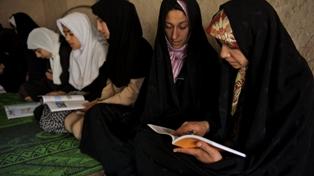KABUL - The 16 Days of Activism against Gender Violence is an international campaign that runs from 25 November, International Day of Elimination of Violence against Women, through 10 December, International Human Rights Day.
This year’s theme is “From Peace in the Home to Peace in the World” highlighting the key roles women play in the family and as peacemakers and peacekeepers in war zones. In Afghanistan, support for women’s issues is one of the five priorities of the United Nations agencies and programmes.
Today’s story is authored by the United Nations
Educated women and healthy families are the foundation of a peaceful and progressive Afghanistan. That is the message that the United Nations family is working towards with the Government of Afghanistan and its partners.
Education of girls and women is a symbol of the change in Afghanistan. Whereas ten years ago girls were prohibited from attending classes, these days they make up over 37 percent of the more than seven million students enrolled in schools. In addition, about 26,000 children are enrolled in kindergartens run by different Government entities and mainly administered by the Ministry of Labour and Social Affairs, Martyrs and Disabled across the country, many with UN support.
But there are still stark disparities in girls’ enrolment. While nine girls attend school for every 10 boys in Herat and Badakhshan, in Uruzgan only two and in Zabul there is only one girl student for every 10 boys, according to the Ministry of Education.
The percentage of the nearly 45,000 women who teach also varies by province. Females make up 73 per cent of the instructors in Kabul and 51 per cent in Balkh, but only four per cent in Uruzgan and one per cent in Paktika.
The higher a girl’s education, the less likely it is that she will marry early. Early brides become early mothers, often becoming pregnant before their bodies and minds are physically mature, leading to physical and psychological problems for the mothers and children.
Early marriage is also often associated with violence. According to a 2010 report by the agency UN WOMEN, almost one-third of Afghan women are exposed to physical and psychological violence, while an estimated 25 per cent suffer sexual violence - often from their husbands or in-laws.
The combat these acts, the UN is working with the Government and its partners to give force to the Law on Elimination of Violence against Women (EVAW) and raise awareness about its importance. It is just one of the ways that the UN is working to help Afghans create a peaceful and progressive country.
Educated women and healthy families are the foundation of a peaceful and progressive Afghanistan.






